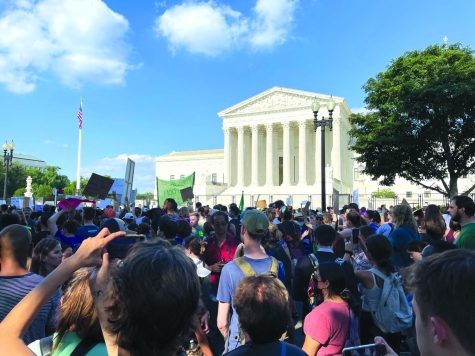Life pre-Roe returns
Students reflect on the ruling
October 6, 2022
The sun blares down on the steps of the Marble Palace as protestors gather, chanting the words “my body, my choice.” In the middle of summer, something came that abortion-rights advocates feared yet anticipated: the overturning of Roe vs. Wade.
On June 24, the Supreme Court’s opinion in Dobbs vs. Jackson Women’s Health Organization became law. While Americans saw this coming after the draft of the opinion was leaked on May 4, the reversal of the landmark case for abortion rights immediately spread all over social media and the news.
The decision ended with a five-to-four majority in the right-leaning court despite 61 percent of Americans believing abortion should be legal in all or most cases, according to Pew Research Center.
However, the ruling did not lead to a complete ban on abortion. Instead, it removed existing protections of abortion rights that kept certain states from implementing trigger laws.
Trigger laws are laws that cannot be enforced until a certain change takes place.
“In this case, if the Supreme Court overturns the decision in Roe vs. Wade, it automatically puts in place these restrictions on accessing abortions,” government teacher Kristen Blevins said.

Texas is one of the 13 states that has a trigger law on abortion. This law went into effect Aug. 25 and criminalizes all abortions from the moment of fertilization except in cases of “a life-threatening physical condition aggravated by, caused by or arising from a pregnancy,” according to the state statute.
Violators of the law could seek a civil penalty ranging anywhere from a $100 thousand fine to life in prison.
This law differs from SB8 – which put restrictions on abortion in Texas before the overturning – in that it targets the abortion provider rather than those seeking abortions.
For Texas Republicans, the ruling comes as a long-sought victory in their fight to criminalize abortion. Conservative lawmakers in the state put these trigger laws in place in hopes that this day would arrive.
Junior Hayden Marchant, who considers herself pro-life, said she was pleasantly surprised by the ruling. She said she believes society should focus more on sex education to prevent pregnancies that are not in the case of incest or rape.
“We wouldn’t have to deal with these difficult debates if we were more diligent with preventing the pregnancies in the first place,” Marchant said.
However, for those who have worked to expand abortion access in the country, the law comes as a major setback to any progress made over the last half-century.
Protests and celebrations took place around the nation as the news reached the homes of citizens following the fights for and against abortion.
Freshman Melinda Hu was in a hotel room in Pennsylvania with her dad when she heard the result of the ruling. Later that day, they decided to drive down to the Supreme Court to join the hundreds of protestors gathering there.
“The whole place was blocked off, and there were so many policemen, but the protest overall was super peaceful,” Hu said.
Hu said she was aware of the leak before the ruling was officially announced but did not think it would actually happen. She considers herself pro-choice and said she worries about those who lack resources necessary to receive abortion care.
The closest abortion provider to Dallas is located 313 miles away in Witchita, Kansas. This means taking a trip requiring time and money some residents of the city cannot afford.
Supreme Court Justice Clarence Thomas argued in the initial opinion that the court “should reconsider” past rulings on topics such as access to contraception. The ruling on contraception access was made in the case Griswold vs. Connecticut on the basis of the right to privacy.
Blevins said the right to privacy creates a gray area since it is not explicitly stated in the constitution but is implied.
“
,” Blevins said.
Pro-choice members of younger generations are taking action to fight for what they believe is right. Senior Josie Agnew has protested in support of abortion rights in the past, and as a result of the ruling, she applied to be on the Planned Parenthood Teen Board.
The board centers around sex education and spreading sexual health awareness to teenagers.
“I wanted to be as involved as I could, and it was the best way for me to have a hands-on experience,” Agnew said.
Currently, Texas is one of 10 states with the highest teen pregnancy rates. It is also one of five without a mandate on sex education.
“To me, the decision is outdated,” Agnew said. “I feel like it’s definitely time for reform and change in this country.”
To read more:
- SB8:
https://capitol.texas.gov/tlodocs/87R/billtext/pdf/SB00008F.pdf
- The Texas trigger law https://www.houstonpublicmedia.org/articles/news/texas/2022/08/25/431599/texas-republicans-long-sought-trigger-law-on-abortion-now-in-effect/
- The case:
https://www.supremecourt.gov/opinions/21pdf/19-1392_6j37.pdf
- The leaked draft:
https://www.politico.com/news/2022/05/02/supreme-court-abortion-draft-opinion-00029473





